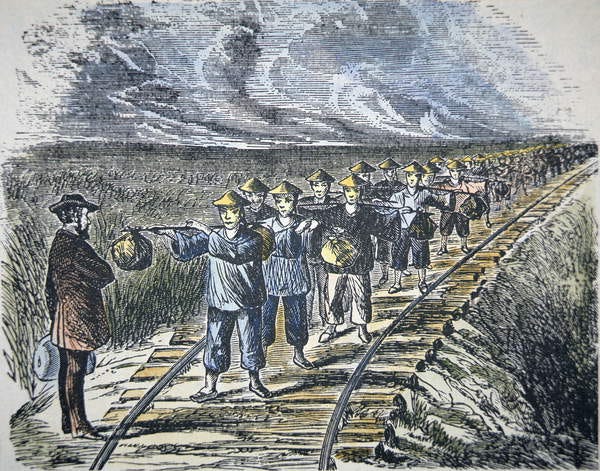On November 17 I was lucky enough to be in the audience at UC Berkeley’s Zellerbach Hall for the Silkroad Ensemble’s performance of American Railroad, a two-hour musical event that explored “the creation of the Transcontinental Railroad through the contributions of African American, Chinese, Irish, Indigenous, and other communities, their cultures, and their music.” It was a thrilling production that blended original music, folk tunes, and Chinese melodies with projections of historical images. Silkroad was founded in 1998 by cellist Yo-Yo Ma and is now led by Rhiannon Giddens, whose brilliant career I’ve been following since her years with the Carolina Chocolate Drops. For American Railroad Giddens sang and played the banjo and fiddle; she was “the ringleader” of the thirteen-member ensemble, “but rarely took center stage,” as Joshua Kosman put it in his rave review for the San Francisco Chronicle.

If you need a refresher about the race to build the Transcontinental Railroad (1865-1869), a monumental feat of engineering that took a devastating toll in human life, here’s a good summary from the Digital Public Library of America. I want to focus, though, not on that history or even on the extraordinary American Railroad production but on a free panel discussion with four Berkeley professors that preceded the performance, titled “Memory, Identity, and Pastness: Considering American Railroad.” They had me at pastness, a word I’d never before encountered and which seemed both mysterious and precise.
It’s not a recently coined word, but neither is it as old as many of our -ness words. Merriam-Webster, which defines it as “the subjective quality of something being remembered rather than immediately experienced,” tells us that the first person to use it in print was James Mill, father of John Stuart Mill, who wrote in 1829:
To our conclusion, that Time is the equivalent of Pastness, Presentness, and Futureness, combined, it may be objected, that the word Time is applicable to all the three cases.
William James, in Principles of Psychology (1890), asked, “How do these things get their pastness? What is the original of our experience of pastness, from whence we get the meaning of the term?” And the literary critic Francis Otto Matthiessen wrote this in 1941 about Herman Melville: “He did not so often think of the presentness of the past as of the pastness of the present, of its illimitable shadowy extensions backward to the roots of history.” (The American rabbi Jacob Neusner echoed that phrase in the title of his 1996 book The Presence of the Past, The Pastness of the Present: History, Time, and Paradigm in Rabbinic Judaism.)
The Google Ngrams graph shows that pastness was used infrequently until the middle of the 20th century. It picked up steam from about 1980 on, when philosophers, theologians, and, yes, musicians began employing it in significant numbers. (I found four record albums with “pastness” in their titles.) Maybe as we hurtle further into the future we’ve become more interested in Pastness Studies.
Pastness may be only two centuries old, but strikes us as a word with even more inherent pastness because of the way it’s constructed. The -ness suffix—unrelated to the Ness of, say, Loch Ness, which is an Old English word meaning “cape” or “headland”—has been with us since Old English (goodness, darkness), and it was easily grafted onto imported Romance words (calmness, muteness). It usually forms abstract nouns from adjectives (madness, consciousness, sameness), although it can also be tacked onto past participles (ashamedness, complicatedness). Pop in a few hyphens and it’s almost infinitely productive, as this list from the OED indicates: Sir-Thomas-Brown-ness, dislike-to-getting-up-in-the-morningness, clean-shirtedness, love-child-ness, singalong-ness. And here’s a fun one from Making New Words, by R.M.W. Dixon (2014): ability-to-dream-up-new-things-ness.
As the “Memory, Identity, and Pastness” panel discussion at UC Berkeley came to an end, I noticed that no one had addressed the pastness in the room, so I raised my hand and asked about that word choice. The moderator, Alexander Benjamin Craghead, said with a tinge of embarrassed-ness that the discussion’s title had been his idea. “Pastness is the sense of the past, as opposed to what happened in the past,” he explained. “It’s how we approach the past.”
Think of it, maybe, as the Past Ness Monster: big, elusive, colored by folklore and romance, and persistently looming, blurrily, on the horizon of our timeline.
UPDATE: Here’s a sentence I just read on Kottke.org: “You can just sense the no-fucks-givenness of the people who put this together.”





So interesting: “Pastness is the sense of the past, as opposed to what happened in the past.” It makes you wonder how one does anything *but sense the past, given that all events and lived experiences are filtered by so many viewpoints and historians.
“What happened” is almost infinitely variable, eh?
The comment about truthiness is spot on. It makes one wonder how the recent pastness of American politics will be recorded.
See also "truthiness"